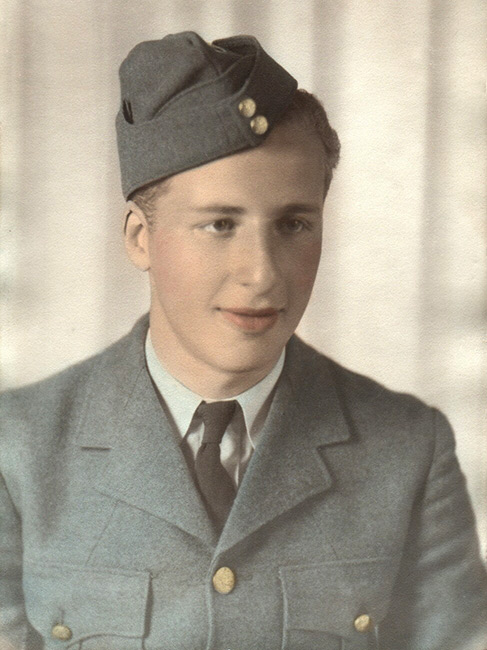Phil Pomerance
Just before he enlisted in the RCAF at age 18, Phil worked on a cross-Canada cattle train.
Phil Pomerance
Just before he enlisted in the RCAF at age 18, Phil worked on a cross-Canada cattle train.
Phil Pomerance
On one trip with the cattle train he almost froze going into Montreal. He decided he didn't want to do that kind of work anymore, so in 1943 at the age of 18, Phil returned to Calgary and enlisted in the RCAF.
Phil was stationed at various British Commonwealth Air Training Plan (BCATP) centers across the prairies where aircrews from all over the Commonwealth including the United Kingdom, Australia and New Zealand were trained. Phil's family billeted many of the officers who came from overseas to train as pilots and aircrew.



Phil was assigned to General Duties and Administration, eventually being stationed at the flight training school at Vulcan, Alberta. Phil could type and take shorthand so it wasn't long before he began to work in the offices managing personnel records.
Phil soon figured out how to scan the records to learn who were the Jewish fellows on the air force bases, including the Jews who had registered as Protestants. "I suppose they were afraid of anti-semitism," he says. Their concerns were unnecessary, he adds, as the stations were generally very accommodating to Jews, making arrangements when possible for kosher meals and providing leave for religious holidays.
The camaraderie of military service suited Phil and he often brought servicemen home to Calgary where his mother and father always put out a meal for them. "My mother was always very proud," he adds, noting that she would be unperturbed when Phil surprised her with three or four hungry men.
"The camaraderie of the air force base was wonderful. People don't realize we all looked after each other. It was a time in our lives when we had that. Once in your life it might happen."
"For many of the fellows it was the first time they had been away from home, from their parents."
The "fellows", as Phil called them, worked closely together and kidded with each other. As a prank, they used their considerable administrative know-how to convince one fellow that he had 48 hours to prepare to be shipped overseas. "The documents looked authentic." The fellow frantically prepared as fast as he could for the new assignment. When they told him it was a joke, "He was ready to kill us," Phil says. "He wouldn't talk to us for weeks."
One fellow kept a locker full of civilian clothes which he rented out to anybody going on leave. "He made $15,000 during the war." Phil sent home $25 of his monthly pay of $60. He didn't gamble like many of the other fellows. "One hour after pay parade, half the men had the other half's money. The gamblers set up a table in the washroom and posted a guard outside in case a sergeant came by."
When he could, Phil hitched a ride home on aircraft being flown from Vulcan to Calgary. He recalls flagging down a plane on the runway only to see that the two pilots had both been drinking. "They were completely sloshed!" With misgivings, he climbed on board. The pilots swooped and soared all the way to Calgary, dive-bombing farmers in the fields for a lark. "I'm not going to get out alive," Phil thought as each reckless manoeuvre brought him closer to death. When Phil stepped onto the tarmac in the cold air of Calgary, his clothing dripped with nervous sweat.
The camaraderie of the air force, however, had its downside. Accidents at the training stations were frequent. Phil recalls the heavily decorated heroes from the Battle of El Alemein arriving at Vulcan for flight training. Within days, several had crashed fatally in training, as did many inexperienced recruits during regular instruction. Training was hazardous.
When fatal accidents occurred, Phil and another fellow had the sad duty of taking care of the details; gathering together the deceased's possessions and sending out next of kin letters.
"It was trying," he admits today. "Here you are sending a letter to a family saying that their son or husband has been in an accident and fatally injured."
"Even if you didn't know them well it was hard. We had to get all their belongings together. It was very emotional."
